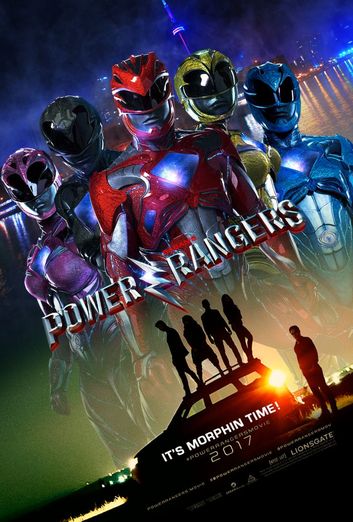 Official movie poster (Lionsgate)
Official movie poster (Lionsgate) I'm sure the motion picture industry made a grip off of folks who were kids during the 1990's, as adaptations of Disney's Beauty & The Beast (check out my review here) and Saban's Mighty Morphin' Power Rangers were released in American theaters within a week of each other. Be still my inner child's heart! Beast was satisfying enough, but the Dean Israelite-directed Power Rangers was so underwhelming and un-rangery that it was dispiriting (screenplay by John Gatnis).
The intriguing attempt to add a little grit and make the film "melodramatic-teen-series meets action-fantasy" would have worked, had there been a better combination of the two. It would be hard to elaborate on this without a run-down, so here it goes:
Instead of upstanding citizens who are active in the Angel Grove community and make good grades, Gatnis' troupe are literally "teenagers with attitude." Eventual captain and red ranger Jason (Dacre Montgomery) is bent on blowing his football/college future away by being a delinquent. Kimberly Hart (Naomi Scott) is a mean-girl frienemy who distributed a sensitive photo of a schoolmate. Zach Taylor (Ludi Lin) is an adrenaline junkie that skips school (with good reason, we find out). Trini Kwan (singer Becky G) is a possible lesbian who clashes with her parents, while Billy Cranston (RJ Cyler) is possibly autistic and frequently finds himself in trouble since his father's death. The quintet's lives collide when they dodge police for being on restricted land and survive a car accident after jumping train tracks (as misfits would do, of course). They manage to defy death because of mystic power coins they find embedded in a rock wall. They awake with superhuman strength, and upon further investigation, discover the underground lair of former ranger Zordon (Bryan Crantson) and his robot assistant Alpha (Bill Hader). It's explained to them that finding the coins after a gazillon years means they're "the chosen ones" and they must defeat the evil Rita Repulsa (Elizabeth Banks), who's resurfaced and wants to attain the universe-yielding Zeo-crystal. She's gone on a killing spree while trying to find and ingest gold to regain full strength. In the hub of the film, we watch the rangers squabble, have a share circle, train and struggle to morph. In this story, morphing into armor is an intrinsic act; they have to "feel" it and be in unison. Zordon, who was unimpressed with them on sight, angrily loses his patience. He lets it slip that he wanted the morphing grid open so he can return to his bodily form (he's in a preserving screen) and handle Rita himself. He and Jason subsequently have a face-off. Rita plays on Trini's outcast insecurities to get her to lure the others into a trap, but Trini chooses to be loyal. Somehow, Trini's family never wakes up during the massive beat-down that ensued, but I digress. The crew decides to approach Rita without Zordon's help. Rita kills Billy, which finally unites them and opens the grid. Zordon sacrifices his chance to reform to resurrect Billy. They morph and fight putties on the ground until Rita unleashes Goldar, who's an extension of her this go 'round. The rangers get in their zords (i.e. battle machines), take down Goldar and kick Rita into the universe, freezing her. Zordon tells them to resume their lives normally and conceal their identities. When the kiddos get back to high school detention, someone is M.I.A.: a new trouble-maker student named Tommy Oliver. The end.
Don't let the lengthy recap fool you into thinking this movie was eventful. The pacing was muggy, stifling and sluggish (particularly in the last hour), making it that much more aggravating the franchise was treated like a sub-plot in its own film. The group spent way too much time not being rangers and many quintessential components were underplayed. For instance, there were minimal martial arts and no teleporting. The significance of the individual and collective function of each color, weapon and dinosaur (of which the uniforms and zords are fashioned after) weren't fully explained. The morph was just delayed, no gratification. It was so anti-climatic. As the teens transform, you get close-ups of their skin crystallizing into armor (no panned body shots), concluding with the red ranger's closed fist. The next thing you know, they're strutting down the walkway. It was like, "Huh? That was it? The whole time, and that's all we get?" In his review for TooFab.com, original blue ranger David Yost wrote of the sequence: "When we said 'It's morphin' time,' you knew sh*t was about to get real... feels a bit lackadaisical and is not the true transformational moment it should be." Amen, brother. Further, all of the action was crammed into maybe the last 20 minutes of the movie, and it was constipated. There were no edge-of-your-seat or "Wow, that totally kicked butt!" moments. Even the archetypal "Will they survive?" scene that's in all superhero flicks falls flat. When Goldar gradually pushes the zord-driving rangers into a fire pit, they're so noble and calm about it. It's as if they're not about to die and all of existence won't suffer at the hands of Rita afterward. The clip does nothing to invoke fear or concern from the audience. Also failing to arouse fear are Goldar and Rita (despite Banks' hearty performance), which brings me to character structure and other plot points that were forfeited in favor of several minutes of annoying teenage angst.
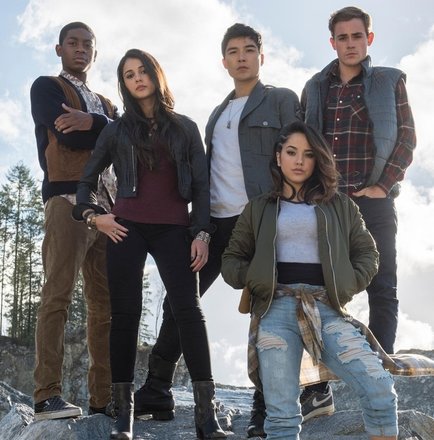 L-R: Cyler, Scott, Lin, Becky G & Montgomery (Lionsgate)
L-R: Cyler, Scott, Lin, Becky G & Montgomery (Lionsgate) Rounding out these characters' motives and journeys would've helped build viewer attachment, fill the story and keep the pace productively moving. For Rita, it might have sharpened her to beef up her beef with Zordon. How did her dark side manifest? Why did she feel like an odd-man-out with him and the rest of her team? Why is controlling the universe something she wants? The same goes for Trini: she was surrounded by outsiders, and yet, she felt out of place. Why? Answering these questions--along with having Trini temporarily flip sides--would've amplified the dynamic between the rangers, Zordon and Rita. I also need to know why Zach kept calling Trini "crazy girl," but that's a much smaller potato, haha. A bigger potato is: what was the point of the squad being misfits if we weren't going to see how being a ranger impacted their lives and mindset? You wanna give these kids depth? Show the maturation, fulfillment and sense of purpose that occurs when you become a part of something bigger than yourself. There should have been a moment where they realize "Hey! I do have value! I am good for something! I just saved the world!" We don't even know what was so special about these younglings that the coins gravitated to them in the first place. The ending also seemed like an incomplete sentence, with no indication as to what the rangers' role would be going forward. Will there be more threats to mankind, or did they just have a one night stand with superhero-dom? This movie functioned like a television pilot: a meatless sandwich with bare-minimum specs. It was like they were waiting to pull out all the stops; worse, like they were waiting for Tommy's appearance in the insinuated sequel. I'm one of those fans that was always a little disgruntled about how the character of Tommy came to eclipse the other rangers, but again, I digress. In film, you don't get an airing next week. You have one shot to make an impression, especially if you want to secure an audience for a follow-up. I'm hankering more for a continuation of my brother's personal comic. His work is so much more riveting, explicatory and soulful, I wish he managed to get it to a studio before Power Rangers as we know it was green-lit.
Among the things to appreciate about Israelite and Gatin's creation were the inklings of campy humor, synonymous with the TV series (although with the show, it wasn't as deliberate). The Zeo-crystal being buried under a Krispy Kreme restaurant was a clever and amusing approach to product placement, playing up its often obtrusive and gaudy nature to an advantage. I chuckled as Rita delightfully chomped into a doughnut while Goldar fought the rangers and Destiny's Child's "Survivor" played on the shop radio. Speaking of the crystal, the nod to 1996's Zeo era was nice. A version of the MMPR theme song being used and a cameo by Amy Jo Johnson and Jason David Frank, two of the series' most popular actors, was more than nice. I told my friend on the way to the theater, "I don't care how good this is; if they don't use the theme song, we're going to have problems," haha. Seeing the elation on other's faces when it came up was priceless. Johnson and Frank (the original pink and green ranger, respectively) appear briefly as Angel Grove citizens thankful to be saved. It would've been great if they had speaking parts, but I'm glad they were included. It's super awesome that Johnson's been asked to join the party for both feature films since she left the franchise (the preceding Turbo: A Power Rangers Movie was released in 1997), and she was happy to come.
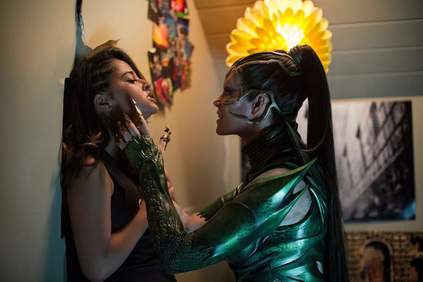 Trini gets a beat down from Banks' Rita (Lionsgate)
Trini gets a beat down from Banks' Rita (Lionsgate) The timing for a rangers genesis film couldn't be more perfect. The show is still on (currently in the Ninja Steel era on the Nickelodeon channel) and one year shy of its 25th anniversary. There's a contemporary audience, and the early fans are young enough to still give a darn. Most of the first cast is still with us and came to the premiere (Trang tragically passed away in a car crash in 2001). Lastly, it's the age of 90's reboots. That said, for Power Rangers to largely reflect its mother-brand in name only, and come off more like a slow episode of Degrassi, is gravely disappointing and feels like a wasted opportunity. There are signs the makers had the best of intentions, but the reduction in action and issues with character structure and detail were overriding. When a movie has a mixed age demographic like this one, it's rare everyone likes or dislikes it for the same reason. In this case, a 10-year-old Ninja Steel watcher and a 30-year-old Mighty Morphin' fan might have a common opinion of Power Rangers: it wasn't morphenomenal.
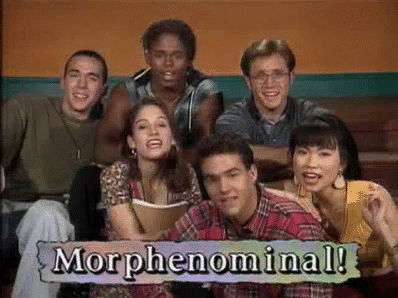
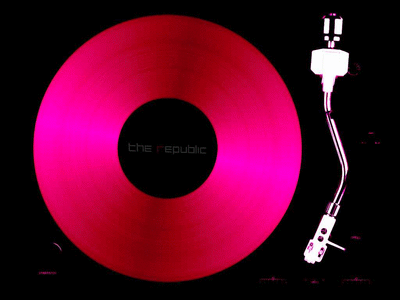
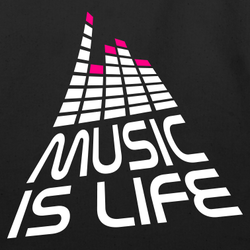
 RSS Feed
RSS Feed